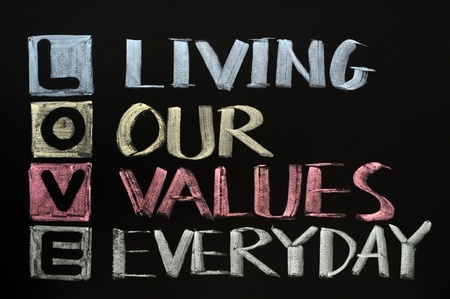Every person has a set of core beliefs within him or her, shaped by a combination of factors, such as upbringing, experiences and faith convictions. Beliefs are the assumptions we make about ourselves, about others in the world and about how we expect things to be.
Our values are, in turn, shaped by our held beliefs, and set the bar for how we think things ought to be or people ought to behave, as well as the kind of qualities that we consider of prime importance, such as honesty, kindness and openness.
In every family, there are some core beliefs and values to which we hold on to as parents, and which we seek to inculcate in our children.

Regardless of your religious beliefs, there are probably a few principles that you hold onto firmly, and which shape the way you view life and respond to people and situations. These values shape everything from the nitty-gritty of how you queue up for the train to bigger rock decisions like whether to live in your own flat or with your parents.
Unfortunately, for many of us, these values go unspoken and, sometimes, assumed. Through experience, we learn the values that our spouse holds on to and discuss its importance to the family when the topic comes up, but these kinds of conversations do not happen naturally most of the time.
We sometimes think that everyone is on the same page, but such assumptions may prove faulty in the event of a crisis, when each person’s true values emerge. Make time to discuss these things as a family and work out what your family will stand for. We find it a useful and meaningful exercise that may help to keep your family centered around a common anchor when times are tough, or when challenging decisions need to be made.
To begin with, perhaps you can explain what values are to your family so that everyone has the same understanding of the term.
Here is a possible definition you could use from the Oxford Dictionary,
“Values are principles or standards of behavior – one’s judgment of what is important in life.”

Next, ask each member of your family to describe or list out which values they think the family should stand for. Each person can have as many on his list as he can think of.
Some values that you may want to consider are:
- Integrity – Being honest and having strong moral principles
- Excellence – Being outstanding or extremely good
- Faithfulness – Being loyal and steadfast
- Patience – The capacity to accept or tolerate delay, problems, or suffering without becoming annoyed or anxious
- Kindness – Being friendly, generous and considerate
Compile all your lists into one long list. Have each person briefly explain what each item means if it’s unclear.
Paste it up somewhere highly visible in the home and give everyone a couple of days to mull over the list and pick their top 10.
Take a vote for each item (each person can vote 10 times) and choose the 10 values with the highest vote.
If all are in agreement that these 10 items are truly representative of what this family stands for, then hooray, you’re done!
Chances are that someone will want to replace one of the 10 with another value from the list. As far as it is possible, have your family members debate and consider the alternative value before making a call. Ultimately, every member of the family has to be able to unequivocally stand by the final list of values – if not, the exercise is meaningless.
Finally, frame up your list of family values and place it somewhere prominent in the house.
Every now and then, and whenever the need calls for it, point the family back to this shared list of values, and let it be your guiding light in making principled decisions for the future.
By Dorothea Chow.
* * * * *
Like what you see here? Get parenting tips and stories straight to your inbox! Join our mailing list here.
Want to be heard 👂 and seen 👀 by over 100,000 parents in Singapore? We can help! Leave your contact here and we’ll be in touch.




























































